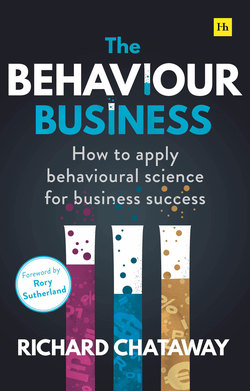Читать книгу The Behaviour Business - Richard Chataway - Страница 6
На сайте Литреса книга снята с продажи.
ОглавлениеForeword by Rory Sutherland
We shape our tools and then our tools shape us.
For the last few decades, aided and accelerated by the invention of the spreadsheet, businesses and public sector organisations have become disproportionately obsessed with measurement and quantification. There is no activity which is not judged on ‘key metrics’ or which is not subject to regular measurement and comparison.
‘What gets measured gets managed’, as the phrase goes.
Hours are duly spent in defining these measures and in devising ways to ‘improve’ them. In time, this results in more and more perverse behaviour, as people run out of good ideas and learn to game the system instead – since anything that improves a metric is rewarded. Highly intelligent people are strangely susceptible to this failing. Recently it was revealed that Ivy League universities were in the habit of encouraging applications from potential candidates who had no hope of being accepted. The reason? By rejecting these candidates’ applications, the university could improve its ‘selectivity stats’ by allowing it to claim that it accepted a smaller percentage of applicants than its competitors, hence burnishing its elite credentials. It seems almost unbelievable that, in the pursuit of improving a measure, leading universities could engage in the hideous practice of falsely raising the hopes of thousands of young people before dashing them. Tragically this is exactly what they did.
The practitioners of this kind of ‘McKinsey Capitalism’ usually think themselves great believers in free markets. And it never occurs to them that there is a whiff of Stalinism about this obsession with statistics, and with the pursuit of false proxy targets at any cost. (At one point, chandeliers in the Soviet Union posed a significant health hazard, since the factory was rewarded on the weight of its output – and had responded by producing light-fittings of such extraordinary heft that ceilings were often at risk of collapse.)
“the pursuit of rational, objective and quantifiable metrics only makes sense if these are closely aligned with the things that your customers care about”
But this is not confined to communism. In fact, any managerial or bureaucratic culture has an incentive to engage in over-measurement, since the act of quantification allows the manager or bureaucrat to present their decision-making as being rational and objective, and thereby sidestep the risk of blame. The reason this causes problems is that the pursuit of rational, objective and quantifiable metrics only makes sense if these are closely aligned with the things that your customers care about. More and more evidence from behavioural science and behavioural economics suggests that this is a very unsafe assumption. In fact, what consumers care about may have very little to do with the objective qualities of a product or service, and their preferences may differ markedly from those of the representative, single, utility-maximising rational agent who populates all economic models.
Making decisions on this basis alone may be good for the manager’s career prospects – but commercially disastrous. Not only does it fail to deliver what consumers really value, but it makes you more and more similar in your decision-making to your think-alike rational competitors.
What gets mismeasured gets mismanaged.
The licence given to businesses by mainstream economics to make decisions while effectively ignoring psychological or perceptual factors is doubly disastrous for business decision-making: it focuses companies on improving the wrong things, and, by assuming consumers to be rational maximisers, it limits the notion of what improvements and innovations might most motivate different customers, who may be highly different in their preferences. It is hence creatively limiting.
To redress this imbalance, marketers and other imaginative business innovators need to use the methodology and vocabulary of behavioural economics to start to win arguments in the boardroom. They need to develop proper new metrics to complement the objective metrics which have become overused. Instead of measuring the length of queues or the overcrowding on trains, they need to measure the irritation of waiting or the level of inconvenience endured. It will take time to redress the balance – but thanks to books like this it is starting to happen.
rory sutherland
London, 2020
